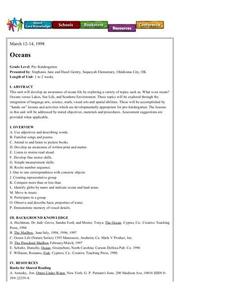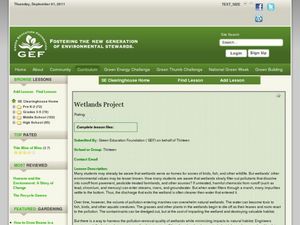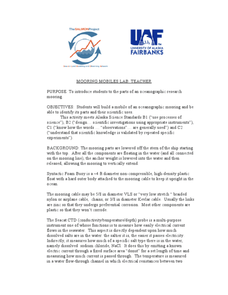Curated OER
Watershed Model
Students view a presentation of water and land and how we need to protect our water resources. In this water lesson plan, students discuss how we rely on water, and complete activities in all subjects related to water.
Curated OER
Humans
In this anatomy learning exercise, students read a passage about the different parts of the human body. They then answer the 10 questions on the page.
Curated OER
What In The World Are Swim Bladders and Why Are They Important
In this swim bladders worksheet, students use a bowl, water, and balloons to make swim bladders, and answer short answer questions about them. Students answer 7 questions and interview someone who has been scuba diving.
Curated OER
Water Ways Lesson Plan #1: Who Catches Your Fish?
Students explore the types of fish caught in the Mid-Atlantic region. In this fishing lesson plan, students learn about fishing methods and meet fishermen that catch the fish. Using the water ways website, students research types of...
Curated OER
Watershed Investigations
Students explore the components of a watershed and the factors that affect it. They read a topographical map and use geometry to determine the area of a watershed. Students estimate the volume of a body of water and perform runoff...
Curated OER
Canadian Conoe Trip
Sixth graders research Canadian geography - the land and the bodies of water. They then plan an imaginary canoe trip through six major water bodies in Canada. They conclude the unit of study with a creative story.
Curated OER
Mini-Ponds
In this mini pond worksheet, students create a mini-pond ecosystem with soil, water, and plant life. Students let their ecosystem sit for a day and they observe a sample the next day. Students identify all the pond water microorganisms...
Curated OER
Echinoderms
In this echinoderm activity, students will explore the characteristics of echinoderms including their body structures and larval stages. Then students will match the five classes of echinoderms to their descriptions. This activity has 4...
Curated OER
Phytoplankton and Ocean Color
Fifth graders identify function of phytoplankton in the biospere by conducting experiments and simulations and reading for information. They detect the presence of phytoplankton in bodies of water by examining ocean in satellite images...
Curated OER
Oceans
Students become aware of the differences between ocean water and lake water by smelling, tasting and seeing. They distinguish between land and bodies of water on a globe and gain increased awareness of oceans and life.
Curated OER
A Coin Out of Water
Pupils examine the Michigan state quarter and identify land and water on the quarter. They locate the Great Lakes and other bodies of water on a map. They compare and contrast streams, rivers, ponds, lakes, and oceans.
Curated OER
The Water Cycle: Crossword Puzzle
In this water cycle worksheet, students complete a 13 word crossword puzzle, using a set of given clues about the water cycle.
Curated OER
Culmination of Mighty Waters
Third graders investigate the concept of bodies of water. The information is obtained from the internet while conducting research. Then students draw upon prior knowledge from a film to combine information for the purpose of creating a...
Curated OER
Wetlands in a Pan
Fifth graders explore the wetlands to discover its benefits in removing pollutants in the water. In this wetlands lesson, 5th graders discuss how stormwater wetlands are created to purify water. Students test the water.
Curated OER
Mooring Mobiles Lab
Oceanography experts use candy to construct a model of a bio-physical mooring that would test a variety of factors. Each piece of equipment to be included on the mooring is described within the write-up. As pupils gather the candies for...
Curated OER
Galileo's Thermometer: Measuring the Density of Various Unknown Liquids
Sprouting scientists explore the concept of density by making mass and volume measurements for five different liquids. From these measurements, they calculate densities. They apply their learning to explain Galileo's thermometer works...
Curated OER
The Rain Game
It's raining, it's pouring! Simulate the precipitation process with rope or hula hoop and assorted colored construction paper. This simple game should give young learners a better understanding of how rain falls.
Curated OER
Your Body: A Bacteria Incubator!
Students use string, a petri dish, water, wipes, and other materials to collect bacteria from their body. In this bacteria lesson plan, students use ingredients to collect bacteria, observe it, predict what will happen over time, and...
Curated OER
What Nutrients Does My Body Need?
Fourth graders examine roles carbohydrates, protein, fat, and water play in maintaining healthy body, and discuss how food provides fuel (energy) to body, how much fuel body needs, how fuel is used, and what happens to unused fuel.
Curated OER
Give Me a Hand, I'm "Thumb-body" Special
Students label the bones in the hand, create a model of the hand, compile a set of fingerprints, and explore the importance of the thumb. In this anatomy of the hand lesson plan, students participate in six hands-on activities to...
Curated OER
Water Quest
Students visit the Hydrology Study Site, conduct a visual survey to discover info about local land use and water quality, and document their findings by mapping the water body. They use this investigation to raise questions for further...
Curated OER
Rock, Soil, or Water?
Students participate in an activity in which they identify properties of water, soil and rocks. They work together to identify different types of rocks. They ask questions to complete the lesson.
Curated OER
Field Trip to test Water Quality
Young scholars examine water quality indicators,test water quality and record their results. In this water quality lesson students complete a water testing lab and complete a lab report.
Curated OER
Animal Science - Body Temperature
Students use the TI-83 + linked to the CBL2 and temperature probes to perform an experiment. Each of the temperature probes is placed into a different cup, one insulated and one not insulated. Each cup holds warm water. The two cups are...
Other popular searches
- Landforms and Bodies of Water
- Major Bodies of Water
- Bodies of Water/rivers
- Bodies of Water Lesson
- Identifying Bodies of Water
- Different Bodies of Water
- Bodies of Water 101
- Water Bodies
- Bodies of Water Word Scramble
- Landforms and Water Bodies
- Earth's Bodies of Water
- Healthy Bodies Water

























